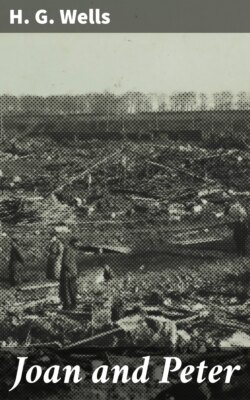Читать книгу Joan and Peter - H. G. Wells - Страница 14
На сайте Литреса книга снята с продажи.
§ 6
ОглавлениеTable of Contents
A little accident which happened a few weeks after Oswald’s departure put the idea of making a will into Arthur’s head. Dolly had wanted to ride a bicycle, but he had some theory that she would not need to ride alone or that it would over-exert her to ride alone, and so he had got a tandem bicycle instead, on which they could ride together. Those were the days when all England echoed to the strains of
“Disy, Disy, tell me your answer true;
I’m arf crizy
All fer the love of you-oo...
Yew’d look sweet
Upon the seat
Of-a-bicycle-mide-fer-two.”
A wandering thrush of a cockney whistled it on their first expedition. Dolly went out a little resentfully with Arthur’s broad back obscuring most of her landscape, and her third ride ended in a destructive spill down Ipinghanger Hill. The bicycle brake was still in a primitive stage in those days; one steadied one’s progress down a hill by the art, since lost to mankind again, of “back-pedalling,” and Dolly’s feet were carried over and thrown off the pedals and the machine got away. Arthur’s nerve was a good one. He fought the gathering pace and steered with skill down to the very last bend of that downland descent. The last corner got them. They took the bank and hedge sideways and the crumpled tandem remained on one side of the bank and Arthur and Dolly found themselves torn and sprained but essentially unbroken in a hollow of wet moss and marsh-mallows beyond the hedge.
The sense of adventure helped them through an afternoon of toilsome return....
“But we might both have been killed that time,” said Arthur with a certain gusto.
“If we had,” said Arthur presently, expanding that idea, “what would have become of Peter?”...
They had both made simple wills copied out of Whitaker’s Almanack, leaving everything to each other; it had not occurred to them before that two young parents who cross glaciers together, go cycling together, travel in the same trains, cross the seas in the same boats, might very easily get into the same smash. In that case the law, it appeared, presumed that the wife, being the weaker vessel, would expire first, and so Uncle Rigby, who had relapsed more and more stuffily into evangelical narrowness since his marriage, would extend a dark protection over Peter’s life. “Lucy wouldn’t even feed him properly,” said Dolly. “She’s so close and childlessly inhuman. I can’t bear to think of it.”
On the other hand, if by any chance Dolly should show a flicker of life after the extinction of Arthur, Peter and all his possessions would fall under the hand of Dolly’s shady brother, the failure of the family, a being of incalculable misdemeanours, a gross, white-faced literary man, an artist in parody (itself a vice), who smelt of tobacco always, and already at thirty-eight, it was but too evident, preferred port and old brandy to his self-respect.
“We ought to remake our wills and each appoint the same guardian,” said Arthur.
It was not very easy to find the perfect guardian.
Then as Arthur sat at lunch one day the sunshine made a glory of the little silver tankard that adorned the Welsh dresser at the end of the room.
“Dolly,” he said, “old Oswald would like this job.”
She’d known that by instinct from the first, but she had never expected Arthur to discover it.
“He’s got a sort of fancy for Peter,” he said.
“I think we could trust him,” said Dolly temperately.
“Poor old Oswald,” said Arthur; “he’s a tragic figure. That mask of his cuts him off from so much. He idolizes you and Peter, Dolly. You don’t suspect it, but he does. He’s our man.”
